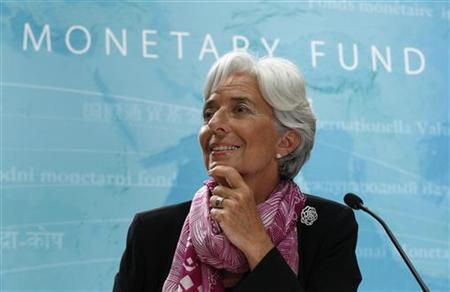IMF's Lagarde Urges Bold US Action To Bolster Global Recovery

International Monetary Fund chief Christine Lagarde hinted Tuesday that the United States should take bold action to help support the fragile global economic recovery.
While not mentioning the U.S. Federal Reserve's two previous rounds of bond-buying known as quantitative easing -- a third, though still hypothetical, iteration has been dubbed QE3 -- Lagarde said in a speech in Washington that past action by the Fed and the European Central Bank had helped keep growth strong and steady.
But Lagarde did tell the annual meeting of the Associated Press that the United States is well positioned to take recovery-boosting action through monetary policy because it currently sees no real sign of inflation. Most other countries, she said, are running deficits that are too high and need to bring down debt over time.
With the recovery still fragile, policy-makers in some countries can and should use the breathing space to finish the job, she said.
The IMF managing director, a former finance minister of France, cautioned the U.S. government against rushing to impose austerity measures, given its low cost of borrowing. A global undifferentiated rush to austerity will prove self-defeating, she said, adding that Washington should make job creation its top priority.
At the same time, Lagarde warned about complacency in tacking U.S. public debt. A stronger push to curb the growth of spending on public-sector entitlements and raise more revenue should ensue, she said. More action is also needed in the United States to ease the burden of household debt, which Lagarde said is holding back the recovery.
The Fund chief also asked the United States to give more money to the 187-nation institution, emphasizing that no country has ever lost money by doing so.
Separately Tuesday, John Williams, president of the Fed's San Francisco branch, urged the U.S. central bank to keep strong monetary stimulus in place.
Like Lagarde, Williams pointed out that the U.S. unemployment rate is high while inflation remains low, leading him to conclude that monetary stimulus makes sense given the Fed's twin policy goals of ensuring maximum employment while keeping prices stable.
Williams, according to the text of a speech to be given at the University of San Diego's business school, didn't address the possibility the Fed will have to consider going beyond what has already been planned for stimulus, as he has in past remarks. That's likely due to recent improvement in the U.S. economy.
Williams is a voting member this year of the Fed's monetary-policy-setting Federal Open Market Committee. Minutes from its March 13 meeting showed that only a couple of members of the FOMC think additional stimulus will be needed if the U.S. economy loses momentum.
© Copyright IBTimes 2025. All rights reserved.





















